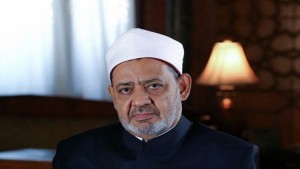CIHRS urges Sheikh of al-Azhar to retract statements condoning violent extremism
The Cairo Institute for Human Rights Studies is appalled by recent incendiary statements by the Sheikh of al-Azhar Ahmed al-Tayyeb undermining the principle of religious freedom and potentially inciting extremist rhetoric and ideas in tandem with legitimizing terrorist violence. Recognizing the esteem vested in al-Tayyeb and the institution of al-Azhar, we urge him to reconsider and retract these statements. In light of the brutal terror attacks on the Prophet’s Mosque in Medina and in other Muslim countries during the last week of Ramadan, governmental-religious institutions, especially in Egypt and Saudi Arabia, bear a historical responsibility to revise religious discourse that inflames and sanctions violent religious extremism.
While discussing Islam’s stance on apostates in two episodes of his Ramadan television program, “al-Imam al-Tayyeb” the Sheikh of al-Azhar states that both classic and contemporary Islamic scholars agree that apostasy is a crime potentially punishable by death. Al-Tayyeb claims there is no contradiction between upholding the principle of religious freedom and sanctioning the killing of citizens simply for changing their religious beliefs. For al-Tayyeb, “freedom of belief is one thing and freedom to renounce a particular religious belief is something else.” Al-Tayyeb’s claim, in fact, contradicts a verse in the Quran affirming that “there is no compulsion in religion.” The Sheikh of al-Azhar is therefore urging Muslim scholars to apply a principle in violation of the Quran itself.
Al-Azhar adopts two contradictory discourses, a relatively open-minded discourse directed abroad and another sanctioning violent extremism intended for
domestic consumption. This contradiction is exemplified by the discrepancy between al-Tayyeb’s March 2016 speech to the German Parliament in which he claims that the principle of religious freedom is enshrined in the Quran; and his speeches and statements delivered in Cairo, which sanction lethal violence against those exercising the right to freely choose their religion. And while the Sheikh of al-Azhar endorses violent extremist practices, the diplomacy of the Egyptian state promotes an unspecified counterterrorism role for al-Azhar in international forums, as in May 2016.
Al-Tayyeb’s negative view of human rights dovetails with statements made by President Abd al-Fattah al-Sisi in May during his meeting with a US congressional delegation and, before that, in a joint press conference with French President Francois Hollande. The statements of both the president and the Sheikh of al-Azhar reflect the belief that human rights is a “Western” concept incompatible with Islamic societies. This idea is ironically consistent with the rhetoric of the Muslim Brotherhood, an organization both the Egyptian state and al-Azhar as an institution view with hostility, and which is accused of extremism by both.
CIHRS urges the Al-Tayyeb and the institution of al-Azhar to reconsider their stance on the principle of religious freedom, and their antipathy towards international human rights conventions. We call on the Sheikh of al-Azhar to follow the lead of jurists and researchers who have championed human rights and freedom of conscience. We further affirm the following:
- Terrorism and extremist religious ideas cannot be countered by adopting an open-minded religious rhetoric that calls for global peace and respect for rights and liberties before the West and international institutions while promoting ideas at home that contribute to the spread of violent extremism through the media, al-Azhar educational curricula, and mosques.
- Extremist religious rhetoric that shows a contempt for fundamental human rights must be reformed. Jurists who believe in the concept of human freedom, particularly the principle of religious freedom, must take a lead in strengthening tolerant and inclusive religious discourse, with input from intellectuals, civil society organizations, and human rights defenders.
- Religious thought and discourse will not be renewed with public relations documents promoting a particular head of state or geared towards international media consumption. We must begin to immediately remove all extremist fatwas inimical to freedom and human rights from religious educational curricula and re-train preachers. Furthermore, we must stop inciting hatred of non-Muslims, peaceful political dissidents, and defenders of human rights and religious freedom; and end collusion with violent extremist discourse.
- President al-Sisi’s political rhetoric on the renewal of religious discourse must also be consistent with his practices. Egypt has seen a marked increase in the number of blasphemy cases referred by the public prosecutor—appointed by the president—to the courts, and convictions in such cases. Earlier this year, a court upheld the one-year prison sentence for researcher Islam al-Beheiri, who responded to Sisi’s appeal for the need to reform religious discourse. Similarly, poet Fatima Naout was sentenced to prison for her criticism of animal slaughter on the Eid al-Adha.
Yet, President Sisi has not used his constitutional authority to pardon people convicted for criticizing extremist religious thought and discourse, nor has he shown the slightest interest—though he issued hundreds of laws in the absence of a parliament—in annulling statutes that allow prison time in freedom of expression cases or under which numerous citizens are prosecuted for blasphemy.
CIHRS urges President al-Sisi to pardon prisoners of conscience convicted on blasphemy and other charges, and it calls on the Egyptian Parliament to repeal the notorious Article 98(f) of the Penal Code on blasphemy.
Share this Post


